#tiger photography
Explore tagged Tumblr posts
Text

Denver Aquarium.
June 2024.
This is one of my favorite pictures that I have ever taken.
Got to love the blep.
#Tigers#Wildlife#Tiger Photography#Big Cats#Wild Cats#Endangered Species#Zoo Animals#Animal Conservation#DenverAquarium#MissedMileMarkers
62 notes
·
View notes
Text


Bengal tigers
#tiger#bengal tiger#feline#cat#photo#photography#cat photo#cat photography#feline photo#feline photography#tiger photo#tiger photography#canon#canon mexico#canon mexicana#canon eos 80d#animal#animal photo#animal photography#photographers of tumblr#photographers on tumblr#zoo#lavender nightjar photography#zoo photo#zoo photography
78 notes
·
View notes
Text
(Moved - photo-specific blog now: @/sincerely-nia)






Tigers 🐯 ❤️
#photography#animal photography#animals#tiger#tiger photography#tiger pics#zoo photography#colorful#colorful photography#Nia notices
19 notes
·
View notes
Text


~ Smudge the Cat Lookalike ~
#nature#nikon#nature photography#nikon photography#wildlife#wildlife photography#original photography#photographers on tumblr#animal photography#photographers of tumblr#amur tiger#amur tiger photography#tiger photography#zoo#zoophotography#colchester#colchester zoo#cat meme#smudge the cat
14 notes
·
View notes
Text

the wild animal sanctuary
#panthera tigris#panthera#panthera tigris tigris#bengal tiger#tiger#tigers#animal photography#asian animals#asia#tiger photography#felidae#big cats#animals#mother nature#appreciate nature#nature photography#nature#photoblog#photooftheday#endangered species#animal conservation#protect our planet
1 note
·
View note
Text
You’ve seen those photos of dogs snapped through catching a treat, with just the silliest faces? I see those and raise you: a tiger catching meatballs.


This is Kali, a Sumatran tigress at the Point Defiance Zoo & Aquarium in Tacoma.
#animal photography#zoo photography#my photography#funny animals#tiger#big cat#Sumatran tiger#endangered species#meat
17K notes
·
View notes
Text

borrowing the tiger’s power
yuzu katou
#aesthetic#art#alternative#photography#cute cats#cats#tigers#animals#animal#artwork#art deco#nature#painting#paint#illustration#illustrator#artists on tumblr#yuzu katou
35K notes
·
View notes
Text
Camera-trapping data revealed in a new study show a steady recovery of tigers in Thailand’s Western Forest Complex over the past two decades.
The tiger recovery has been mirrored by a simultaneous increase in the numbers of the tigers’ prey animals, such as sambar deer and types of wild cattle.
The authors attribute the recovery of the tigers and their prey to long-term efforts to strengthen systematic ranger patrols to control poaching as well as efforts to restore key habitats and water sources.
Experts say the lessons learnt can be applied to support tiger recovery in other parts of Thailand and underscore the importance of the core WEFCOM population as a vital source of tigers repopulating adjacent landscapes.
The tiger population density in a series of protected areas in western Thailand has more than doubled over the past two decades, according to new survey data.
Thailand is the final stronghold of the Indochinese tiger (Panthera tigris corbetti), the subspecies having been extirpated from neighboring Cambodia, Laos and Vietnam over the past decade due to poaching, habitat loss and indiscriminate snaring...
Fewer than 200 tigers are thought to remain in Thailand’s national parks and wildlife sanctuaries, only a handful of which are sufficiently undisturbed and well-protected to preserve breeding tigers.
The most important of these protected areas for tigers is the Huai Kha Khaeng Thung Yai (HKK-TY) UNESCO World Heritage Site, which comprises three distinct reserves out of the 17 that make up Thailand’s Western Forest Complex (WEFCOM). Together, these three reserves — Huai Kha Khaeng Wildlife Sanctuary, Thungyai Naresuan West and Thungyai Naresuan East — account for more than a third of the entire WEFCOM landscape.
Now, a new study published in Global Ecology and Conservation documents a steady recovery of tigers within the HKK-TY reserves since camera trap surveys began in 2007. The most recent year of surveys, which concluded in November 2023, photographed 94 individual tigers, up from 75 individuals in the previous year, and from fewer than 40 in 2007.
Healthy tiger families
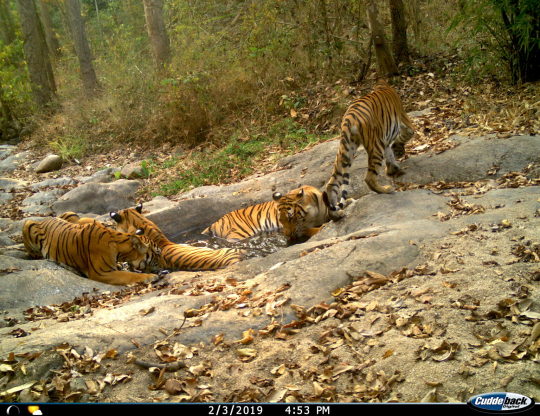
The study findings reveal that the tiger population grew on average 4% per year in Hua Kha Khaeng Wildlife Sanctuary, the largest and longest-protected of the reserves, corresponding to an increase in tiger density from 1.3 tigers per 100 square kilometers, to 2.9 tigers/100 km2.
“Tiger recoveries in Southeast Asia are few, and examples such as these highlight that recoveries can be supported outside of South Asia, where most of the good news [about tigers] appears to come from,” said Abishek Harihar, tiger program director for Panthera, the global wildcat conservation organization, who was not involved in the study.
Among the camera trap footage gathered in HKK-TY over the years were encouraging scenes of healthy tiger families, including one instance of a mother tiger and her three grownup cubs lapping water and lounging in a jacuzzi-sized watering hole. The tiger family stayed by the water source for five days during the height of the dry season.
The team of researchers from Thailand’s Department of National Parks, Wildlife and Plant Conservation, the Wildlife Conservation Society, Kasetsart University, and India’s Center for Wildlife Studies deployed camera traps at more than 270 separate locations throughout the HKK-TY reserves, amassing 98,305 days’ worth of camera-trap data over the 19-year study period.
Using software that identifies individual tigers by their unique stripe patterns, they built a reference database of all known tigers frequenting the three reserves. A total of 291 individual tigers older than 1 year were recorded, as well as 67 cubs younger than 1 year [over the course of the study].
Ten of the tigers were photographed in more than one of the reserves, indicating their territories straddled the reserve boundaries. The authors conclude that each of the three reserves has a solid breeding tiger population and that, taken together, the HKK-TY landscape is a vital source of tigers that could potentially repopulate surrounding areas where they’ve been lost. This is supported by cases of known HKK-TY tigers dispersing into neighboring parts of WEFCOM and even across the border into Myanmar.
Conservation efforts pay off
Anak Pattanavibool, study co-author and Thailand country director at the Wildlife Conservation Society, told Mongabay that population models that take into account the full extent of suitable habitat available to tigers within the reserves and the likelihood that some tigers inevitably go undetected by camera surveys indicate there could be up to 140 tigers within the HKK-YT landscape.
Anak told Mongabay the tiger recovery is a clear indication that conservation efforts are starting to pay off. In particular, long-term action to strengthen systematic ranger patrols to control poaching as well as efforts to boost the tigers’ prey populations seem to be working, he said.
“Conservation success takes time. At the beginning we didn’t have much confidence that it would be possible [to recover tiger numbers], but we’ve been patient,” Anak said. For him, the turning point came in 2012, when authorities arrested and — with the aid of tiger stripe recognition software — prosecuted several tiger-poaching gangs operating in Huai Kha Khaeng. “These cases sent a strong message to poaching gangs and they stopped coming to these forests,” he said."
...ranger teams have detected no tiger poaching in the HKK-TY part of WEFCOM since 2013.
-via Mongabay News, July 17, 2024
#tigers#thailand#thai#endangered species#big cats#conservation#wildlife#wildlife conservation#wildlife photography#poaching#good news#hope
2K notes
·
View notes
Text

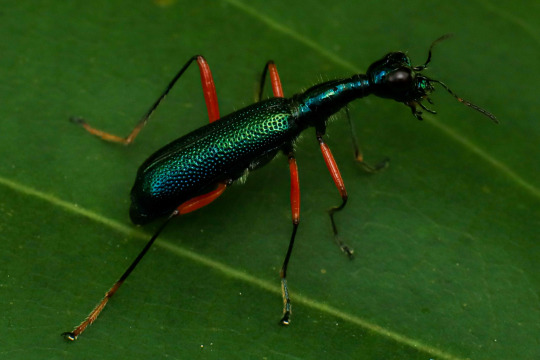
tiger beetle... shiny
tiger beetles are pretty underrated when it comes to 'beetles that social media loves' it feels like every species is in some wacky colour like even the sleek black ones have brightly coloured legs
anyway heres one with a bluish green, highly punctated elytra and orange midlegs just chilling
i have a pic of this tiger beetle thats like rainbow coloured it actually looks like it eats skittles as its diet... its an old and kinda crappy photo let me know if you would like to see that one
#photography#macro#nature#bugs#arthropods#insects#entomology#beetles#coleoptera#bugblr#tiger beetle#shiny
934 notes
·
View notes
Text
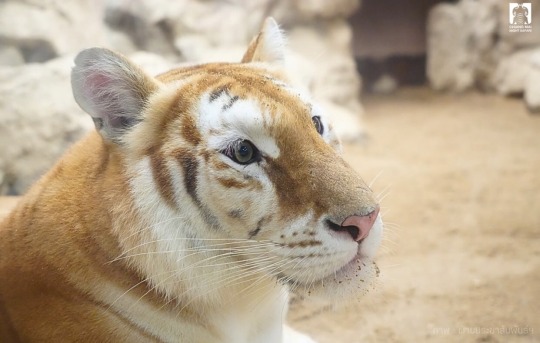








Meet Ava, a golden tiger in a zoo in Thailand who goes viral for being extremely cute
© Chiang Mai Night Safari, Thailand
*bonus (look at her!!)

#thailand#tiger#tigers#animals#zoo#cute#wholesome#light academia#aesthetic#photography#positivity#nature#naturecore#curators on tumblr
838 notes
·
View notes
Text
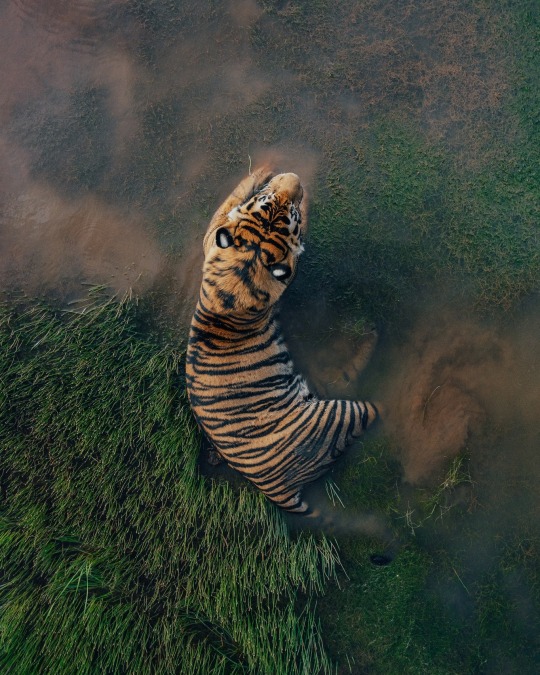
(discovery)
2K notes
·
View notes
Text

Undercarriage
#nature#photography#nature photography#flowers#floral#naturecore#summer#summer flowers#butterflies#butterflycore#eastern tiger swallowtail#swallowtail butterflies
929 notes
·
View notes
Text

Tiger Lilly
1K notes
·
View notes
Photo

~ Amur Tiger ~
#photography#animal photography#nikon#nikon photography#zoo#zoophotography#photographers on tumblr#wildlife#wildlife photography#tiger#tiger photography
6 notes
·
View notes
Text

skull of a Smilodon Populator Lund, 1842 at the Museum of Zoology of the University of São Paulo, Brazil
#photography#skull#skeleton#tiger#tigers#ancient times#ancient animals#animals#cats#big cats#historical#museum#sao paulo#brazil#aesthetic#aes#x
264 notes
·
View notes
Text
I present to you: the aforementioned tiger shenanigans.
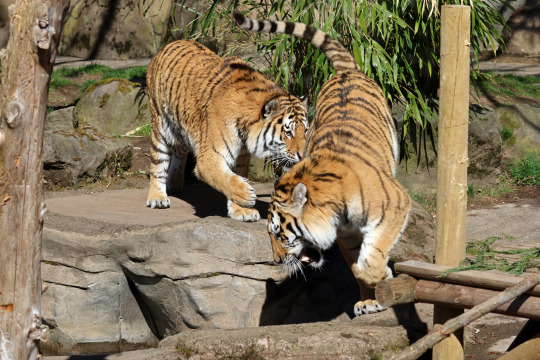

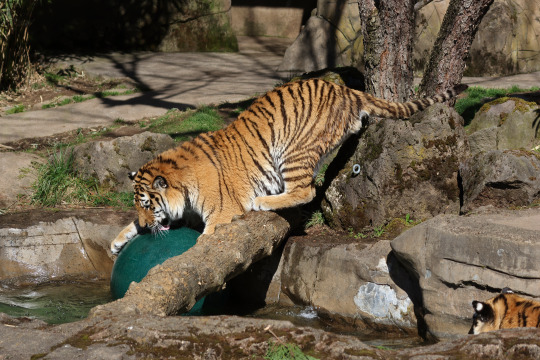
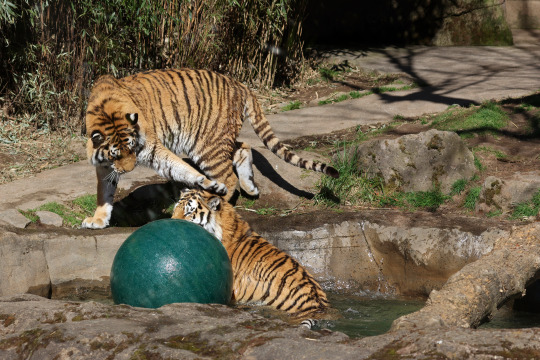
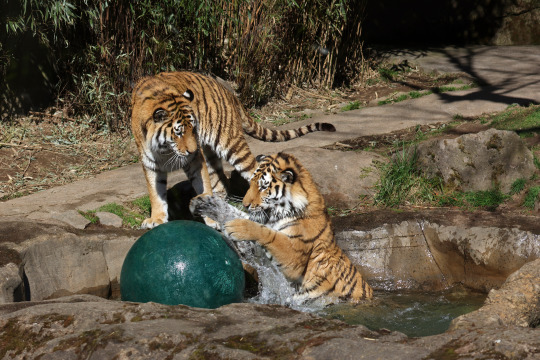
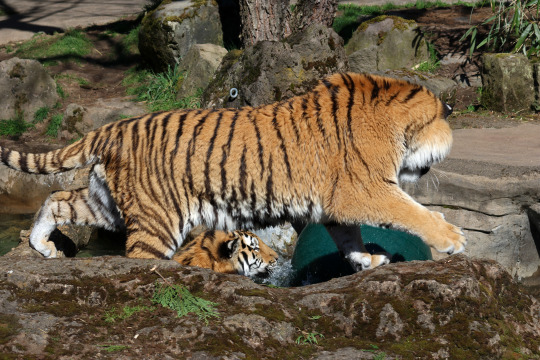
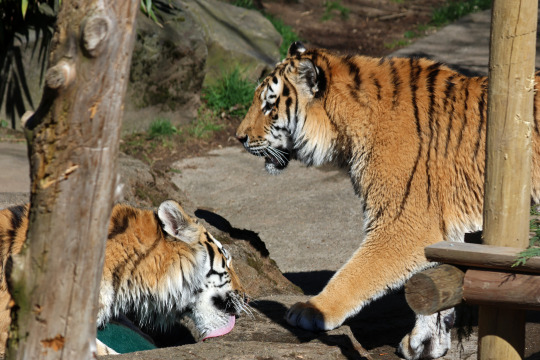
This is Amur tiger brothers Luka and Dmitri, who just turned two a few days ago! Two boys and their boomer ball.
1K notes
·
View notes